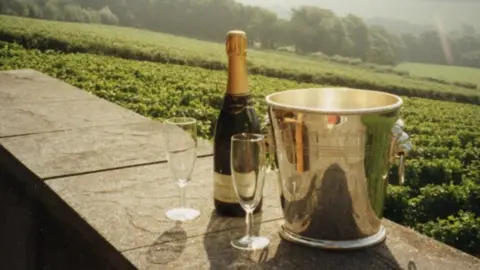UK winemakers toast record year
 Camel Valley Wines 2018
Camel Valley Wines 2018A record number of bottles of UK-made wine reached the market last year, up 64% from 2016, as vineyards released more sparkling and specialist wines.
The Wine and Spirit Trade Association (WSTA) said the industry was reaping the benefits from a "huge" investment over the last decade.
Last week Camel Valley vineyard in Cornwall became the first English wine producer to be granted a royal warrant.
That has led to speculation it may be on the menu at Prince Harry's wedding.
In January Ladbrokes opened odds on wines that could be on the breakfast menu when Prince Harry marries Meghan Markle in May.
Favourites include Kent producer Chapel Down and the Queen's own English sparkling wine, Windsor Park, as well as Camel Valley, which produces both still and sparkling wines.
The profile and production of English wines, especially sparkling wines, have risen dramatically in recent years, although they still struggle to compete on the global market.
Last May UK wine producers warned that the 2017 crop would be severely damaged by late frosts.
However, the WSTA said that last year's record figures dated back to a bumper harvest in 2014. English sparkling wine is made with the same traditional method as Champagne, meaning it is left to age in the bottle for several years.
WSTA said a number of producers had also released special edition and older vintage wines in 2017. The organisation said 3.86 million bottles of UK-made wine reached the market last year.
"English wine releases reached a record high in 2017 with more varietals and vintages available, giving consumers a greater choice than ever before," said WSTA chief executive Miles Beale.
He said the new challenge was to meet growing demand and increase exports.
Mark Driver, co-founder of Rathfinny Wine Estate in Sussex, which is expanding its production of its own sparkling wine, said French interest in UK production was also increasing.
Two French Champagne houses, Vranken-Pommery and Taittinger, have already made investments in UK wine production.
"The success of English sparkling wines has led Champagne houses to invest in vineyards in the south of England as the chalky soils and climate are very similar to those found in the Champagne region," Mr Driver said.
